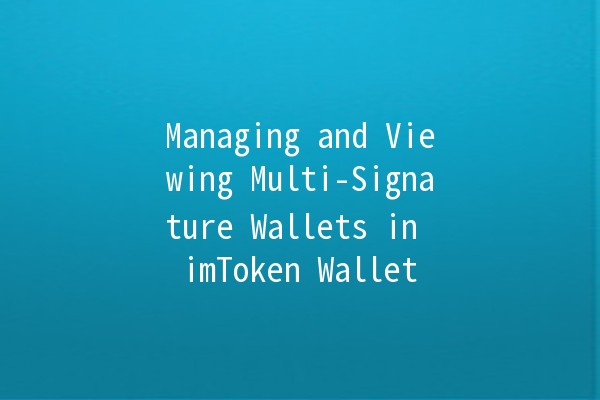In the fastevolving world of cryptocurrencies, secure management of digital assets is paramount. Multisignature wallets have surged in popularity due to their enhanced security features, requiring multiple parties to authorize transactions. For imToken wallet users, understanding how to efficiently view and manage multisignature wallets can significantly streamline asset handling and improve security. This article delves into practical tips and techniques that will enhance your productivity when interacting with multisignature wallets using imToken.
Multisignature wallets, or multisig wallets, represent a pivotal advancement in cryptocurrency security. Instead of a single private key, multisig wallets use several keys from different devices or individuals, creating a layer of security that mitigates risks associated with lost or stolen keys.

In a multisignature setup, the wallet is controlled by multiple key holders. For example, a 2of3 multisig wallet requires two out of three key holders to approve a transaction. This arrangement makes unauthorized access more difficult, as hackers would need to compromise multiple keys to gain control of the funds.
imToken is a leading digital wallet with a userfriendly interface supporting various blockchain assets. It provides essential features tailored for managing multisignature wallets effectively:
Explanation: Establishing a multisig wallet in imToken starts with choosing the right configuration. Users can customize how many signatures are required for transactions.
Application Example: Suppose you and two partners want to invest in a cryptocurrency project. By setting up a 2of3 multisig wallet, both you and a partner must sign off on any withdrawals, thus retaining control over the invested capital.
Explanation: Keeping your security measures up to date is crucial. Regularly changing passwords and ensuring all key holders practice good security hygiene can prevent unauthorized access.
Application Example: Set calendar reminders every three months for all key holders to rotate their access credentials and review device security settings regularly.
Explanation: In a multisignature setup, it’s essential to have a secure backup for each keyholder's private key. Losing a key held by one party can lock you out of the wallet indefinitely.
Application Example: If you use a hardware wallet as a key, make sure to store the recovery phrase in a safe place, such as a bank vault or a secure cloud storage solution with twofactor authentication.
Explanation: Setting up notifications for transactions in imToken can keep all keyholders informed of any activity, deterring fraudulent actions and fostering transparency.
Application Example: Enable push notifications for transaction approval requests so all keyholders receive alerts whenever an action is taken. This mutual oversight encourages accountability.
Explanation: Periodically reviewing transactions and wallet balances can help identify any discrepancies and ensure proper asset allocation.
Application Example: Sit down quarterly with your coholders to review transaction histories and determine if any adjustments need to be made for your investments or spending.
The imToken wallet provides a robust platform for managing multisignature wallets, enhancing both security and collaborative asset management. By implementing these practical tips, users can significantly improve their management of digital assets, ensuring smoother transactions and fortified security.
A multisignature wallet offers enhanced security as it requires multiple approvals for transactions, preventing unauthorized access. This setup is particularly useful for organizations and groups managing shared resources.
Yes! imToken allows you to use multisignature in conjunction with other security measures such as twofactor authentication (2FA) and biometric locks to enhance security further.
To view transactions, open your imToken wallet and navigate to the transaction history section. Here, you can filter by wallet or date to find the specific transactions you’re looking for.
The limits for the number of keys in a multisignature wallet depend on the wallet's design but typically allow a minimum of two and a maximum that can reach up to 15 distinct addresses.
If a key holder loses their key, it could compromise access to the funds. It’s advisable to create a backup key or recovery method before setting up a multisig wallet to prevent complete loss of access.
All keyholders should agree on regular scheduled reviews or updates to interact with the multisig wallet actively, ensuring that everyone is aware of the transactions and changes in security settings.
By understanding and utilizing these tips and information, imToken wallet users can efficiently manage their multisignature wallets with confidence and security.